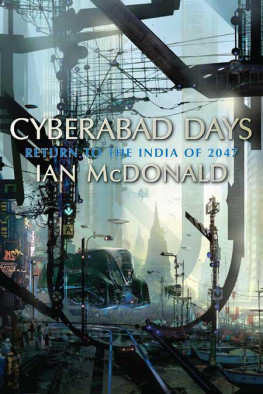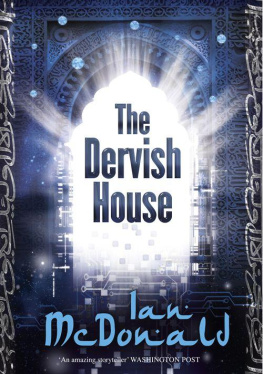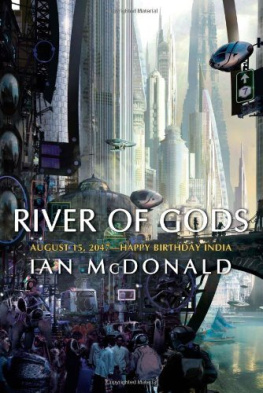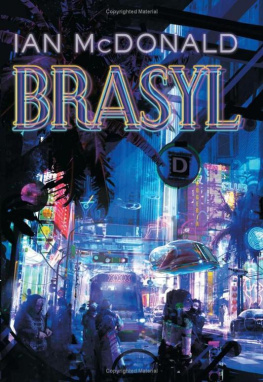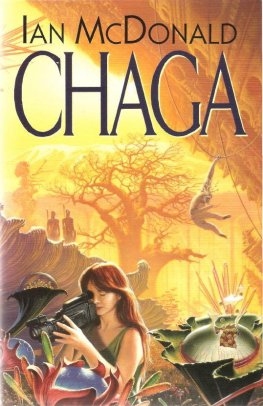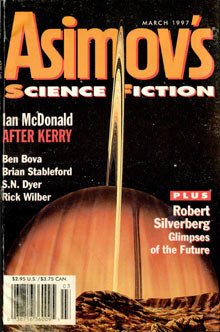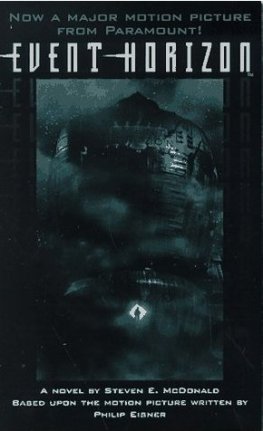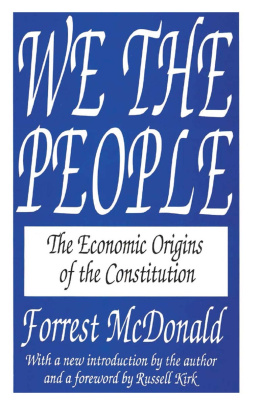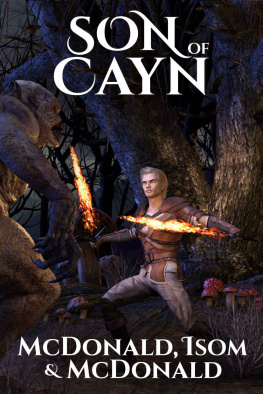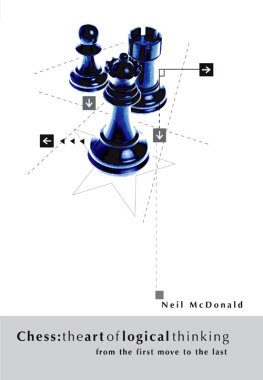Ian McDonald - Cyberabad Days
Here you can read online Ian McDonald - Cyberabad Days full text of the book (entire story) in english for free. Download pdf and epub, get meaning, cover and reviews about this ebook. genre: Detective and thriller. Description of the work, (preface) as well as reviews are available. Best literature library LitArk.com created for fans of good reading and offers a wide selection of genres:
Romance novel
Science fiction
Adventure
Detective
Science
History
Home and family
Prose
Art
Politics
Computer
Non-fiction
Religion
Business
Children
Humor
Choose a favorite category and find really read worthwhile books. Enjoy immersion in the world of imagination, feel the emotions of the characters or learn something new for yourself, make an fascinating discovery.
- Book:Cyberabad Days
- Author:
- Genre:
- Rating:4 / 5
- Favourites:Add to favourites
- Your mark:
- 80
- 1
- 2
- 3
- 4
- 5
Cyberabad Days: summary, description and annotation
We offer to read an annotation, description, summary or preface (depends on what the author of the book "Cyberabad Days" wrote himself). If you haven't found the necessary information about the book — write in the comments, we will try to find it.
Cyberabad Days — read online for free the complete book (whole text) full work
Below is the text of the book, divided by pages. System saving the place of the last page read, allows you to conveniently read the book "Cyberabad Days" online for free, without having to search again every time where you left off. Put a bookmark, and you can go to the page where you finished reading at any time.
Font size:
Interval:
Bookmark:
Cyberabad Days
Ian McDonald
Contents
Introduction
America Is Not the Only Planet
by Paul Mcauley
According to William Gibson, the future is already hereit's just not evenly distributed yet. A cursory glance at recently published science fiction shows that depictions of the future aren't evenly distributed either: the majority of science fiction depicts futures dominated by American sensibilities and cultural and economic values, and inhabited by solidly American characters. Sure, there have always been writers like Maureen McHugh and Bruce Sterling, and more recently Nalo Hopkinson and Paulo Bacigalupi, who have embraced a broader, global view of the future, but the default mode of science fiction is that of American hegemony, and an assumption that the values of Western late-stage free-market capitalism will endure pretty much unchanged even unto empires flung up around the farthest stars. This isn't surprising, because modern science fiction was invented in the United States in the 1930s, and the United States is still the dominant marketplace for written science fiction (and it's the major producer of science fiction television shows and movies, too). But even before the ill-advised War on Terror and the global economic crash, it's been clear that although the twentieth century can legitimately be called the American century, in the twenty-first century the nexus of technology-driven change and economic and political power will almost certainly be located elsewhere. In China or India or Brazil; maybe even in Russia or Europe, if those old powers can shake off the chains of history and truly reinvent themselves. But most definitely not in the United States.
British science fiction writers have a long tradition of filtering the memes and tropes of modern science fiction through their own cultural viewpoint; they're the aliens in the Yankee woodpile. In Arthur C. Clarke's space fictions, British astronauts drank tea and fried sausages in their lunar excursion vehicles, showed the heir to the throne how to jockey rockets into orbit, and returned alien artifacts to the British Museum rather than the Smithsonian. The New Worlds' crew turned their backs on the Apollo program and dived into inner space. And the Interzone generation of writers infused the heartland dreams of science fiction with a globalized ethos: the future as London's babylon, a vibrant, sometimes frictive patchwork plurality of culturesSomalis in Kentish Town, Bangladeshis in Brick Lane, Turks in Green Lane, Congolese in Tottenham Hale, and so on and so forthwrit large.
Ian McDonald, to get to the point of this introduction, was in on the globalization of science fiction right from the beginning of his career. His first novel, Desolation Road, mapped Bradbury's Mars onto Gabriel Garcia Marquez's One Hundred Years of Solitude; later novels and stories featured Africa as a venue for transformative biotech and alien invasions; all showcased his ability to use cut-ups and mix-mastered imagery appropriated from the vast storehouse of science fiction and the vaster stores of the happening world to create vivid bricolages crammed with eyekicks, to do the police in a variety of voices. River of Gods, widely praised and nominated for all kinds of awards, was a significant evolutionary leap in his game. Set in an epic, complex, and richly detailed depiction of a near-future India split into competing yet interdependent states, ifs narrative is likewise split into a multiplicity of viewpoints, detailing from a variety of perspectives the attempt by a community of artificial intelligence to win legitimacy and freedom either by reconciliation with or independence from their human creators. The stories collected here share the same setting as River of Gods. History runs like a river through them, yet they are closely focussed on the dilemmas of people caught up in the currents of social and technological change: a boy who dreams of becoming a robotwallah, fighting wars via remotely controlled battle robots, is given a sharp lesson in the real status of his ultracool heroes; a young woman who was once feted as a god tries to find a new role in a world where AIs are the new deities; the marriage between a dancer and an AI diplomat is overshadowed by the growing hostility between the human and machine spheres. McDonald's characters are vividly and sympathetically drawn; his prose is richly infused with a rushing immediacy; the exoticism (to Western sensibilities) of India's crowded and chaotic cities and her rich and ancient and complex mythology infuse and complement and transmute the exoticism of a future as rich and bewildering and contradictory as our present, a hothouse venue of technological miracles teetering on civil war and every kind of social change. Unlike the futures of default-mode science fiction, conflict is not resolved by triumph of thesis over antithesis, but by adjustment, adaptation, and accommodation. In McDonald's Bollywood babylon, history is in constant flux, always flowing onwards, never staying still, yet preserving in the shape of its course certain immutable human truths. Things change; yet some things remain the same. The future of this clutch of fine stories is only one of many possible futures, of course, but it as exciting and challenging and humane and self-consistently real as any of the best: we can only hope that we deserve one like it.
Sanjeev and Robotwallah
Every boy in the class ran at the cry. Robotwar robotwar! The teacher called after them, Come here come here bad wicked things, but she was only a Business-English aeai and by the time old Mrs. Mawji hobbled in from the juniors only the girls remained, sitting primly on the floor, eyes wide in disdain and hands up to tell tales and name names.
Sanjeev was not a fast runner; the other boys pulled ahead of him as he stopped among the dal bushes for puffs from his inhalers. He had to fight for position on the ridge that was the village's highpoint, popular with chaperoned couples for its views over the river and the water plant at Murad. This day it was the inland view over the dal fields that held the attention. The men from the fields had been first up to the ridge; they stood, tools in hands, commanding all the best places. Sanjeev pushed between Mahesh and Ayanjit to the front.
"Where are they what's happening what's happening?" "Soldiers over there by the trees."
Sanjeev squinted where Ayanjit was pointing but he could see nothing except yellow dust and heat shiver. "Are they coming to Ahraura?"
"Delhi wouldn't bother with a piss-hole like Ahraura," said another man whose face Sanjeev knewas he knew every face in Ahrauraif not his name. "It's Murad they're after. If they take that out, Varanasi will have to make a deal."
"Where are the robots, I want to see the robots."
Then he cursed himself for his stupidity, for anyone with eyes could see where the robots were. A great cloud of dust was moving down the north road and over it a flock of birds milled in eerie silence. Through the dust Sanjeev caught sunlight flashes of armor, clawed booted feet lifting, antennae bouncing, insect heads bobbing, weapon pods glinting. Then he and everyone else up on the high place felt the ridge begin to tremble to the march of the robots.
A cry from down the line. Four, six, ten, twelve flashes of light from the copse; streaks of white smoke. The flock of birds whirled up into an arrowhead and aimed itself at the trees. Airdrones, Sanjeev realized, and, in the same thought: Missiles! As the missiles reached their targets the cloud of dust exploded in a hammer of gunfire and firecracker flashes. It was all over before the sound reached the watchers. The robots burst unscathed from their cocoon of dust in a thundering run. "Cavalry charge!" Sanjeev shouted, his voice joining with the cheering of the men of Ahraura. Now hill and village quaked to the running iron feet. The wood broke into a fury of gunfire; the airdrones rose up and circled the copse like a storm. Missiles smoked away from the charging robots; Sanjeev watched weapon housings open and gunpods swing into position.
Next pageFont size:
Interval:
Bookmark:
Similar books «Cyberabad Days»
Look at similar books to Cyberabad Days. We have selected literature similar in name and meaning in the hope of providing readers with more options to find new, interesting, not yet read works.
Discussion, reviews of the book Cyberabad Days and just readers' own opinions. Leave your comments, write what you think about the work, its meaning or the main characters. Specify what exactly you liked and what you didn't like, and why you think so.

